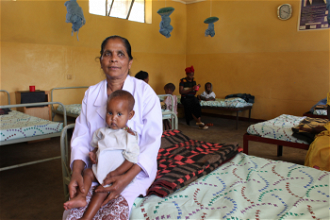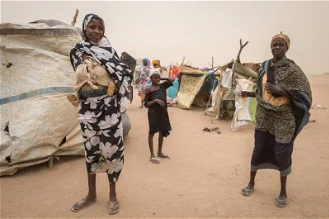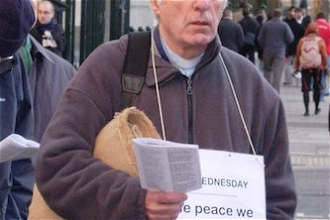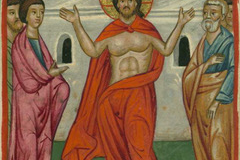Ethiopia facing worst drought in half a century

Sr. Celine with small child at nutrition clinic. (Val Morgan/SCIAF)
With the 'Horn of Africa' currently feeling the devastating effects of the El Nino climate phenomenon, Catholic agencies say Ethiopia is now facing the worst drought it has seen in half a century. The gradual onset of this crisis poses aid agencies with a dilemma. Will we have to wait until there are shocking pictures of malnutrition before the world wakes up to the threat? I certainly hope not, because Ethiopia has every chance of overcoming the danger of famine - as long as help arrives in time.
CAFOD and its partners, SCIAF in Scotland and Trocaire in Ireland, are helping the local Catholic Church and other local organisations in Ethiopia to respond, but the needs are immense. In December 2015 the Ethiopian Government announced that 10.2 million people needed emergency food assistance; 5.8 million people needing water, health and sanitation; and more than 2.1 million people with nutrition needs including 400,000 severely malnourished children. It is feared that these numbers could rise and currently over 18 million people are at risk, which is close to 20 per cent of the population. The Ethiopian government is importing vast quantities of wheat from many parts of the world and is coordinating the response. Immediate food, water and health needs are critical in over half the country's 700 districts. At the same time, everyone is hoping that the Spring rains will come, and thus there is an urgent need for seeds in the country.
The value of timely intervention could be seen at the Taza Catholic Church Health Clinic in Hosana, Hadiya Zone, in southern Ethiopia, where 32-year-old Muniva Haji Ahamed had brought her son Adildbari, four, who was suffering from malnutrition. "I went to two hospitals before, but their treatment didn't help," said his mother. "People I know told me to come to this clinic. When I brought the baby, it was like I was carrying a dead body, he was so limp. He was not opening his eyes or his mouth, and had no appetite. If he drank something, often he would vomit it up." At first Adildbari was given four-hour feedings of Plumpynut, a highly nutritious peanut-based supplement. Within three days he was able to hold a cup and drink milk. "I never thought the child would reach this stage," said his mother. "I thought he would die on the way here."
Sr Celine of the Maids of the Poor is in charge of the health centre. It includes a stabilisation clinic for malnourished children, supported by the three UK and Irish Catholic charities, which pay staff salaries and have provided mattresses, bedding and mosquito nets. "The number of mothers and babies varies due to the season," said Sr Celine, who comes from Managalore in India but has lived in Ethiopia for 26 years. She says: "In the dry season, January, February and March, the number of children will increase. They will come from very far away, and we need to give them care. At the beginning we had nothing, but things are much better than they were. A non-governmental organisation came and trained us in how to look after malnourished children. Now we know to give them milk and Plumpynut." Over the years the clinic has saved the lives of thousands of children, but Sr Celine is concerned about what happens afterwards. "The situation here is very sad," she said; "many people have no food or medicine and when they go home they can face unthinkable problems."
But the story of Woltelserhun Aoane, a 35-year-old mother of seven children, gives hope that the cycle of hunger can be broken. Three years ago she had to bring two of her children, a daughter of one and a son of three, to the clinic with malnutrition. "On the way to the clinic the boy was so weak he couldn't walk anymore," she said. "I was crying, I thought he was going to die. I was praying to God to save him." The children were treated at the clinic for almost two months, but the family benefited from a livelihoods programme once they were strong enough to leave. Apart from being given seeds to grow potatoes, maize, haricot beans, they were paid to build terraces and received small loans and training in business skills. Best of all, two goats supply two litres of milk a day to feed the children.
"There have been many improvements in our lives since we got help," said Woltelserhun. "Now I have three different plots of land, amounting to half a hectare. I grow maize, potatoes and wheat. I'm now working and can feed my family". He adds: "If the programme had not supported us, I or my children would have died. Your help has saved our lives. I say thank you, thank you for your help."
Patricia Wall, Ethiopia Country Representative for CAFOD, SCIAF and Trocaire says: "We are supporting the local Catholic Church and other local organisations in Ethiopia to respond but the needs are immense. The Ethiopian government is importing vast quantities of wheat from many parts of the world. Immediate food, water and health needs are critical in over half the districts (known as woredas) in Ethiopia (approximately 700 districts in total).
"At the same time everyone is hoping that the Spring 2016 rains will come and thus there is an urgent need for seeds in the country. We are fully in support of the Ethiopian Catholic Church appeal and would encourage others to support the response. We are working on the ground with the Church and have provided technical expertise and funding to support the response effort at national and Diocesan level."
CAFOD link: www.cafod.org.uk





















